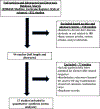Rate of Risk Factors for and Interventions to Reduce Hospital Readmission in Patients With Inflammatory Bowel Diseases
- PMID: 31470176
- PMCID: PMC7044053
- DOI: 10.1016/j.cgh.2019.08.042
Rate of Risk Factors for and Interventions to Reduce Hospital Readmission in Patients With Inflammatory Bowel Diseases
Abstract
Background & aims: We investigated 30- and 90-day rates and causes of, risk factors for, and interventions to reduce hospital readmission in patients who received medical treatment for inflammatory bowel diseases (IBD).
Methods: We performed a systematic search of publications through July 1, 2018 for studies of rates of hospital readmission and associated causes and risk factors in patients who received medical treatments for IBD. Our final analysis included 17 cohort studies (6324 patients) of hospitalized adults with IBD who had received medical treatment, along with reported readmission rates with detailed chart review. We performed random effects meta-analysis to estimate 30- and 90-day rates of readmission and identified causes and risk factors associated with readmission. We also performed qualitative analyses of studies that focused on interventions to reduce readmission.
Results: Overall, the 30-day rate of readmission was 18.1% (95% CI, 14.4-22.4) and the 90-day rate was 26.0% (95% CI, 22.7-29.6). On meta-regression, studies with higher proportions of patients with ulcerative colitis than Crohn's disease reported higher risks for readmission. Most common reasons for readmission were IBD flare, infection, or complications from unplanned surgeries during hospitalizations. Consistent risk factors for 30-day readmission were admission for pain control (odds ratio [OR], 2.27; 95% CI, 1.69-3.03), need for total parenteral nutrition on discharge (OR, 2.13; 95% CI, 1.36-3.35), and prior or unplanned surgery during admission (OR, 3.11; 95% CI, 2.27-4.25). Only 1 study focused on interventions (specialized inpatient IBD service) to reduce risk of readmission.
Conclusions: Overall 30- and 90-day rates of readmission for patients who received medical treatment for IBD are 18.1% and 26.0%, respectively. IBD flares and infections are common reasons for readmission, and inadequate pain control and need for parenteral nutrition were common risk factors. Interventional studies to reduce risk of readmission are needed.
Keywords: Burden; CD; Population Health; UC; Value-Based Care.
Copyright © 2020 AGA Institute. Published by Elsevier Inc. All rights reserved.
Figures
References
-
- Mehta F Report: economic implications of inflammatory bowel disease and its management. Am J Manag Care 2016;22:s51–60. - PubMed
-
- Molodecky NA, Soon IS, Rabi DM, et al. Increasing incidence and prevalence of the inflammatory bowel diseases with time, based on systematic review. Gastroenterology 2012;142:46–54 e42; quiz e30. - PubMed
-
- Singh S, Brill JV, Proudfoot JA, et al. Project Sonar: A Community Practice-based Intensive Medical Home for Patients With Inflammatory Bowel Diseases. Clin Gastroenterol Hepatol 2018;16:1847–50 e1. - PubMed
-
- Dulai PS, Singh S, Ohno-Machado L, Sandborn WJ. Population Health Management for Inflammatory Bowel Disease. Gastroenterology 2018;154:37–45. - PubMed



